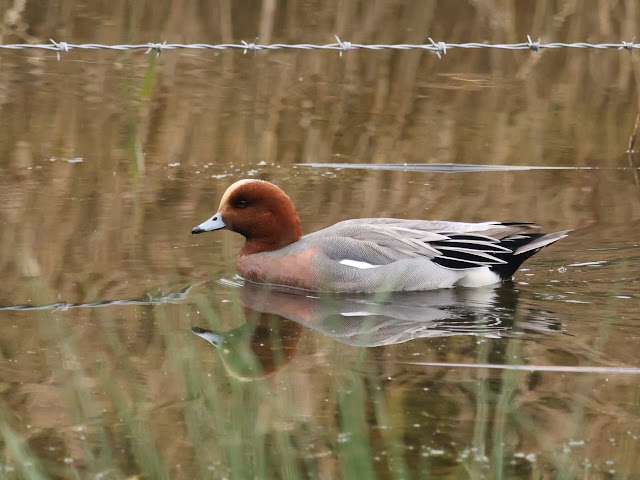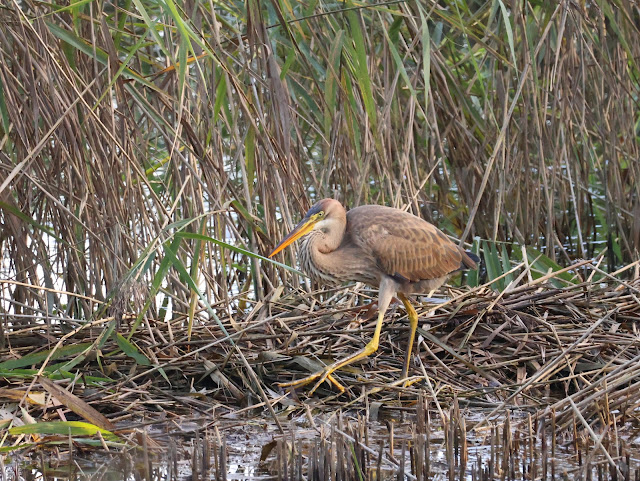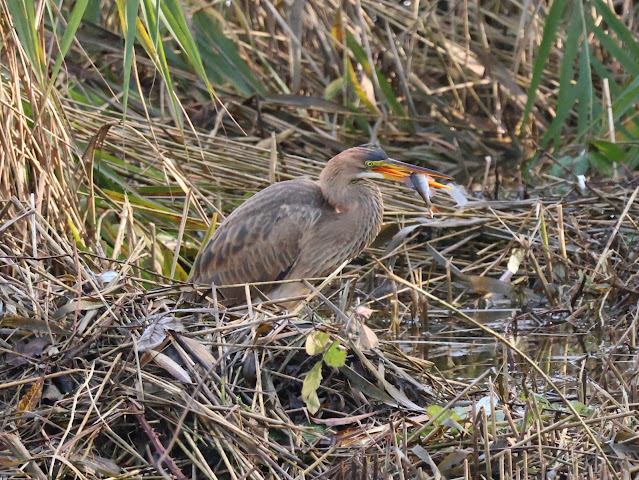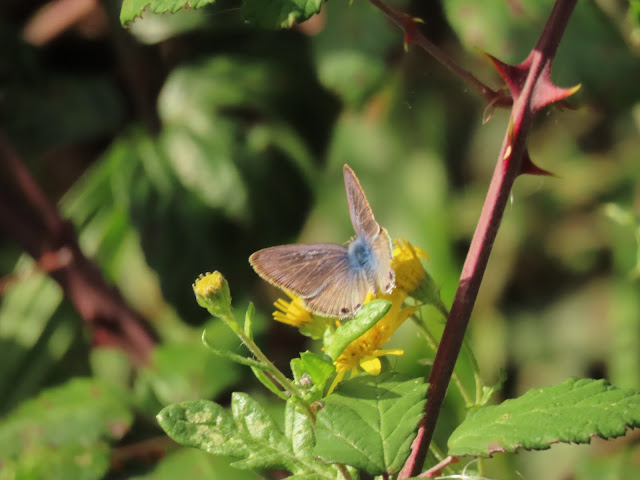I spent a couple of hours at a rather overcast Slimbridge wetlands Centre today. Highlights were two water rail feeding close to the Willow Hide and the newly arrived Bewicks swans on the Rushy Pen.
Friday, 15 December 2023
Monday, 30 October 2023
ANOTHER LOOK AT THE PURPLE HERON AND AN OSPREY FLYPAST!
With only a small number of purple herons visiting the UK each year, I thought I'd revisit Whelford pools to see the juvenile bird once more and hopefully see it for longer than the five minutes last Monday! On Saturday a lot of birders were disappointed that the heron didn't turn up at all, but I found out that it had been showing earlier this morning. Having completed my mornings jobs at home, I arrived at 11.20 to find the car park full but managed to squeeze between two cars further along the road meaning a short walk back to the reserve.
As expected the benches were full, but there was standing room at the back of the hide and I found a good spot and waited. The heron had apparently flown off and no one was sure if it would return. Thankfully a seat became vacant so I sat down and began to wait. Someone had put out seeds in a couple of feeders in front of the hide so there was a constant stream of blue and great tits with the occasional robin or dunnock. After about three quarters of an hour, just as a couple had given up and left the hide, the purple heron flew in! And this time it looked like it was there for the rest of the day! To start with it walked along carefully in front of the reeds and back, before stopping to catch a fish. It disappeared for a bit, though could be seen by people at the far end of the hide who said it was fishing regularly. Eventually it made its way back and then settled down just behind a pile of dead reads and stayed more or less motionless, occasionally lifting up his head, or darting at a fish that had strayed into its territory. Meanwhile, an observant watcher had noticed an osprey pass overhead with a fish, which was an added bonus to my visit.
Having sat for a couple of hours and with the heron still present but not moving much, I decided to give up my seat to someone else and headed home.
Monday, 23 October 2023
A LOCAL PURPLE HERON!
When I looked at the local birding blog for Gloucestershire this morning I saw someone had posted some photos of a juvenile purple heron, seen well from a hide at an undisclosed location. The only purple heron I've seen was at Blenheim Palace several years back, so this would be an interesting sighting if I knew where it was! After leaving work I checked the Cotswold water park sightings for a Great Northern Diver seen recently, and then saw that the purple heron was in fact at Whelford Pools, only a few miles away! Only problem, my camera and binoculars were at home, so I frustratingly had to drive a 50 minute round trip to get them ! (But at least I could grab some lunch!)
Knowing that Whelford Nature reserve only has a small carpark, I was slightly apprehensive as to whether I would be able to park, but thankfully there were some spaces. The hide is only a very short walk from the car park and I was relieved to find that there was still a bench free from where I could see out onto the cut area of the reeds in front of the hide.
The heron had apparently been stalking amongst the reeds about an hour earlier but had flown off to the right. I had the rest of the afternoon more or less free so decided to wait and see if it returned to its regular spot. I didn't have to wait more than ten minutes before someone said 'oh that looks like a bittern...no... its the purple heron flying in!' and it landed about 10 metres away in full view of the watchers. For about five minutes it walked from left to right and back again and gave some good views, before flying off to the left and up into some trees where it remained out of sight for the next half an hour! As it didn't look likely to return I decided to call it a day.
Saturday, 21 October 2023
OTTERS AT LOWER MOOR FARM
It was a rather drizzly start to Saturday but I thought I'd go over to Lower Moor Farm and spend some time in one of the hides to try out my new camera. It was very quiet and in fact from the first two hides there was no bird life to see at all! At the third hide heron was perched at the far side of the pool and I was quite pleased with the results my camera gave in rather low light.
On leaving the hide, I saw a couple of visitors with cameras approaching and they told me they'd seen one of the resident otters close to them on the 'fishing lake' although it had taken fright on seeing them and swam off to the opposite of the lake.
I made for the spot where they'd last seen the otter and after scanning through my binoculars for a short time, saw some movement in the distance and three otters swimming and diving in unison. They surfaced and dived once or twice then disappeared into the bank behind some trees.
A path alongside the lake led to a viewing point somewhat nearer and I took this path, eventually stopping at a break in the hedge. I could hear the barking, yelping noises of the otters fairly near then heard a splash. One of them then appeared swimming about ten metres away before retreating out of site. I did manage a couple of photos though which again I was pleased with. After this I decided to return home as there wasn't really much other action.
Back home, my bird feeders were busy and to my surprise I saw a male brambling amongst the tits and finches. I've never seen one in my garden before - a sure sign of autumn!
Saturday, 14 October 2023
ESTUARY TOWER
There was a noticeable drop in temperature today for my visit to Slimbridge. After the mild temperatures during the week, l needed a couple of extra layers and even considered whether I needed a woolly hat!
I hadn't any particular focus for my visit, although during the week, a pectoral sandpiper and a barred warbler had been regularly seen but they had not been recorded during yesterday's inclement weather. On arrival at the WWT Centre, I checked the twitter feed and I saw that both were apparenty still present but sadly today I dipped on both of them, Although seen first thing, the barred warbler did not put in an appearance in its usual favoured area, the small copse below the Estuary tower. There were other small birds present, namely, chiffchaffs, blackcaps, goldcrest, blue and great tits but no other warblers. The pectoral sandpiper was never going to be easy to see from the Zeiss hide, with numerous ducks asleep and all at a distance and I had to give up on that one too.
However, all was not lost, as whilst viewing from the Estuary tower' first floor, someone came in from the open air top and asked the birders present if they were aware of a lesser whitethroat amongst the Canada geese. Most of us were puzzled for a moment, (what was a lesser whitethroat doing amongst geese?) until we realised he had actually said Lesser Whitefront! The goose had just been spotted and was causing a wave of excitement amongst birders, as it was a rare find.
I have to admit that I would never have spotted it, but another birder kindly let me view it though his 'scope and I was then able to find it in my binoculars. It is usual for Slimbridge to host a flock of white fronted geese in the winter months, but the 'lesser' species is slightly smaller with a larger white 'front' and a yellow eye ring and it is much rarer in the uk. |I wonder whether it will be gone after only a short time, or, whether it will choose to spend the winter here. Let's hope it's the latter!
Saturday, 7 October 2023
ON THE TRAIL OF A LONG TAILED BLUE
A few years ago I became aware that long tailed blue butterflies were now migrating to our shores regularly, and could be seen along the south coast in late summer/autumn. Two of the favoured spots were Brighton Whitehawk hill nature reserve and Lancing Ring which is another reserve further west along the south coast.
This week I've been reading some of the sightings for Sussex butterfly conservation and realised that if i could manage it, this autumn's late summer sun would provided ideal conditions for a visit to West Sussex to see them. I tried to find further details of where to look on Lancing Hill, and found frequent references to a 'chalk pit'' and the 'Ring' .Although I did not know exactly the location of these spots, I know that where butterflies are to be found there are generally other people to ask, so Ihoped for the best!
So, at short notice I booked a hotel room at Arundel and drove down to Sussex on my Friday off. As I prefer to leave early to avoid too much traffic I decided to start the day by visiting Arundel's WWT Centre which would be the sixth WWT centre I've visited. I didn't really expect to see a lot of new birds, but I knew I could buy a decent light lunch in their restaurant! I arrived well before it opened at 10 o'clock, and after wating in my car, went in as soon as the doors were opened. The Centre isn't particularly big and I easily toured the whole sigh within a couple of hours, though without any sightings of note. I didn't have time to try the electric boat ride but I enjoyed the pelican exhibit and the raised pond area, where goosanders and common scoters came right to the edge, almost close enough to touch.
After an early lunch, I then headed to Lancing Ring where I hoped that the warm sunshine would provide me with the butterfly sightings I was hoping for. On reaching the car park, I looked at the map, to see if I could locate the chalk pit where 2 long tailed blues had been recorded on most days this week. I took what I thought must be the correct path but it didn't seem to lead to anywhere that looked a suitable spot so I returned to the carpark. I did see a wall butterfly resting on the path though. How frustrating to have driven all the way to a butterfly site, but not knowing where to look!
My second option was to find the 'Ring' of trees which give the reserve its name. I met some ladies dog-walking, one of whom kindly showed me how to get to the Ring which in fact was a clump of trees. I recalled that the sightings description referred to an area of ash clearance so after asking another lady where that was I ventured down a path bordered by brambles where some new trees had been planted in plastic tubes. Then suddenly I saw a greyish blue butterfly flutter past... had I found my first long tailed-blue? I watched it carefully until it eventually landed on a plant just next to the path. Although rather tatty, I could see the dark spots on its wings which confirmed that it was although the blue colour had very much faded and the tails were m missing!
It flew off and I stopped and waited to see if it would return. Just then a gentleman with binoculars came along and asked me if I'd found what I wanted to see. I said yes and while we talked the long tailed blue re-appeared and settled not too far away from us. When I asked if this was a good spot to look, he said it was but he could show me some other places so I followed him and we found several sheltered areas where as many as three ( all males) were flying together.
In conversation, I mentioned clouded yellows and he said that if I wanted to he could take me to a field margin where there was a good chance of seeing some. It must have been at least a ten to fifteen minute walk, but we had some interesting 'butterfly' discussions on the way. At first we only saw some 'whites' but then after scanning through binoculars he gave a shout that he'd found a clouded yellow , and as it flew towards us and beyond, its golden yellow wings were very much in evidence. Feeling rather elated, that I'd now seen my 49th butterfly species of the year ( my previous records have peaked at 47) , we continued to scan the set aside edges and found a second. However neither stopped anywhere near or long enough for even a record photo.
Returning uphill to our starting point, I told my 'guide' ( who turned out to be the author of the sightings blogs that I'd been reading!), that I'd been unable to find the chalk pit. So he said as he was going there anyway he'd show me the way. It turned out that I hadn't gone far enough along the path I'd taken earlier in the afternoon and if I had continued to walk I would have found a turning to the right signed 'nature reserve'. I could immediately see that this spot might be good for butterflies as it was sheltered and in a dip. However, despite waiting in the area where they were usually seen, no more long tailed blues appeared, which was a bit disappointing for a few other people who joined us at the same time and hadn't yet seen any. Although it was still only half past three in the afternoon, the clouds were beginning to block out the sun and it was probably too late in the day for more butterfly sightings. However, we did see a 'nest' of a wasp spider which was very interesting to look at.
After returning to my car, ready to go to my hotel, I felt pleased that my short trip to Sussex to find long tailed blues had been successful.
Monday, 25 September 2023
GREY PHALROPE
NEVER A WASTED VISIT TO THE FOREST OF DEAN
I usually make a day trip to the Forest of Dean around this time of year, visiting four sites, in fairly close proximity to each other s...

-
I read a blog recently which suggested that the hawfinches at Parkend were really not worth visiting, as the area is so busy with dog walk...
-
With a morning set aside for some birding while I was staying in Kent, I decided to focus on seeing species that I don't normally see ...
-
My original plan for today was to make another trip to the New Forest but after a rather busy week, and a weather forecast which kept ...



























































.JPG)
